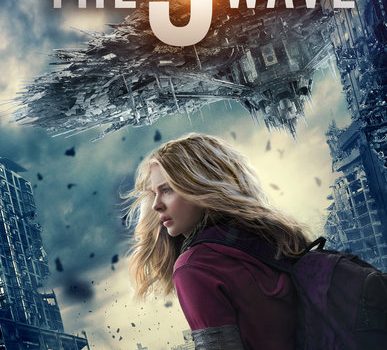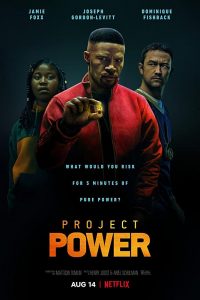A Divergent Hunger Maze Game: A Review of The 5th Wave
 It seems to be the new pattern for Hollywood success: write a young adult novel about an apocalyptic future society wherein likable teenagers are oppressed by evil adults, ostensibly for some noble purpose; stretch the story out into (at least) a trilogy; sell the rights to film producers anxious to exploit a pre-sold property, designed to appeal to a coveted target audience, that requires no expensive stars; and achieve fame and fortune from the resulting three (or four) popular movies based on your work. As I argued in a previous review, Orson Scott Card’s Ender’s Game (1985) provided an early model for these stories; then came Suzanne Collins’ Hunger Games trilogy (2008-2010), James Dashner’s Maze Runner tetralogy (2009-2012), and Veronica Roth’s Divergent trilogy (2011-2013). Now, having begun his own as-yet-incomplete trilogy with The 5th Wave (2013), Rick Yancey is stepping forward to claim his piece of the pie.
It seems to be the new pattern for Hollywood success: write a young adult novel about an apocalyptic future society wherein likable teenagers are oppressed by evil adults, ostensibly for some noble purpose; stretch the story out into (at least) a trilogy; sell the rights to film producers anxious to exploit a pre-sold property, designed to appeal to a coveted target audience, that requires no expensive stars; and achieve fame and fortune from the resulting three (or four) popular movies based on your work. As I argued in a previous review, Orson Scott Card’s Ender’s Game (1985) provided an early model for these stories; then came Suzanne Collins’ Hunger Games trilogy (2008-2010), James Dashner’s Maze Runner tetralogy (2009-2012), and Veronica Roth’s Divergent trilogy (2011-2013). Now, having begun his own as-yet-incomplete trilogy with The 5th Wave (2013), Rick Yancey is stepping forward to claim his piece of the pie.
Though the film series launched with Divergent in 2014 somehow escaped my attention, I have been dutifully watching and reviewing all adaptations of the other listed texts, and confronting a year that is not offering an over-abundance of meritorious science fiction films, I reluctantly selected The 5th Wave to complete my quota of 2016 reviews. For there is only so much one can say about films that relentlessly celebrate the unalloyed wonderfulness of young people and reprehensible perfidy of adults (with some rare exceptions), and in my last examination of such a film, The Hunger Games: Mockingjay – Part 2 (2015), I fear that I was beginning to run out of things to say (so I will decline to provide the link, though I can’t prevent you from searching for that review, or the other six that fall into this category). As I consider The 5th Wave, therefore, the only logical strategy is to focus on what is different about Yancey’s approach to this lucrative genre.
The obvious innovation is that whereas the other series featured human adults in charge of repressive regimes as the villains, The 5th Wave involves sinister aliens who are seeking to conquer the Earth (though all the aliens we see happen to look like human adults). So this film is also part of a long tradition of novels and films about alien invasions, dating back to H. G. Wells’s The War of the Worlds (1898) and still thriving today, as evidenced by this film and another one on my 2016 list, Independence Day: Resurgence. But how might an author shoehorn the Collins-Dashner-Roth formula into a story about an alien attack? It is hard to imagine aliens who would only target young people, or aliens who would forge an alliance with human adults to terrorize young people. Yancey’s answer is ingenious and revelatory: his aliens begin their assault by disabling all of Earth’s technology with an electromagnetic pulse; they then trigger a massive earthquake that floods the world’s coastal cities; they unleash a deadly virus that, in the novel at least, kills all but a handful of Earth’s people; and they unveil an army of human quislings, secretly implanted long ago with a controlling alien intelligence, to begin slaughtering the survivors. Finally, as their final and utterly devastating “5th Wave,” the aliens turn to the most terrifying weapon that humans could possibly imagine: their own children.
Yes, that is Yancey’s story (though describing it in full requires a mild “spoiler”): as heroine Cassie Sullivan (Chloë Grace Moretz) struggles to stay alive in her devastated world, aliens pretending to be human soldiers recruit her kid brother Sam (Zackary Arthur), her heartthrob Ben Parish (Nick Robinson), and other youths and send them through basic training so that, imagining they are killing aliens, they can be sent out to shoot down any humans who managed to live through the pulse, earthquake, plague, and alien snipers. In the minds of these aliens, in other words, there is no reason to bother with trivial menaces like another global earthquake or another lethal disease when they can now deploy the ultimate, unstoppable force, a well-trained twelve-year-old. (Orson Scott Card nods approvingly.)
It is at this point that Yancey’s saga begins to seem very, very similar to other stories about alien invasions. He begins his novel by announcing that he is taking a different, more realistic approach, as narrator Cassie sarcastically describes “the aliens we imagine”: “They swoop down from the sky in their flying saucers to level New York and Tokyo and London, or they march across the countryside in huge machines that look living mechanical spiders, ray guns blasting away, and always, always, humanity sets aside its differences and bands together to defeat the alien horde. David slays Goliath, and everybody (except Goliath) goes home happy.” Such stories, Cassie concludes, are “crap …. like a cockroach working up a plan to defeat the shoe on its way down to crush it.” And Yancey has a point: if advanced aliens with superior technology did decide, for some reason, to attack the Earth, they would undoubtedly possess weapons that humans could not possibly resist, making their victory inevitable.
However, Yancey is eventually forced to contradict his own logic, knowing that Hollywood is never going to purchase the rights to a story about a successful alien invasion that concludes with the death of the last person on Earth and the triumph of the alien assailants. Like all other authors who have sought to profit from such adventures, he needs to assume that, despite their formidable resources, the aliens would begin to make one stupid mistake after another, enabling the beleaguered humans to defeat them. Thus, Yancey’s aliens failed to consider the possibility that some of the alien-infested youths who grew up as human beings might retain some affection for the species, or that it might prove counterproductive to train children to become efficient killers if they manage to figure out what is really going on. In other words, the aliens’ fatal flaw was making the common adult mistake of underestimating the intelligence of Earth’s brilliant children – interestingly, also the mistake that doomed Cassie’s father Oliver (Ron Livingston); for when soldiers suddenly appear and begin barking out orders, a properly suspicious Cassie advises her father that they don’t need to obey people who happen to be wearing uniforms, yet Oliver naïvely trusts the soldiers until it is too late. These crafty aliens, then, may be able to outwit Earth’s adults, but they have clearly met their match in Cassie and her fellow teenagers.
So, his saga is still unfinished, but based on the conclusion of The 5th Wave and events in its sequel The Infinite Sea (2014), it seems likely that Yancey will end up telling yet another story about how “humanity” – young humanity – “sets aside its differences and bands together to defeat the alien horde.” Still, there is one aspect of Yancey’s novel that does raise the possibility of a slightly different conclusion: we are told that the aliens were initially divided about the plan to eradicate the human race, as some supported an effort to achieve peaceful “Coexistence” with humanity. Perhaps, then, there will emerge a faction of “good aliens” who join with humans in order to defeat the “evil aliens.” But unsurprisingly, given Hollywood’s proclivity for the black-and-white simplicity of melodrama, the film says nothing about dissenting (and potentially sympathetic) aliens; instead, one of the alien-occupied snipers announces that people in his situation must make a choice between being an (obviously evil) alien or being an (obviously good) human, and the film thereby conveys the message that the only good alien is a dead alien.
The other differences between the novel and the film are relatively inconsequential; one of the secret of Collins’s, Dashner’s, Roth’s, and Yancey’s success is to write novels that read like screenplays in the form of prose, so that turning them into screenplays is relatively effortless. Here, all screenwriters Suzannah Grant, Akiva Goldsman, and Jeff Pinkner had to do was a little polishing and streamlining: an early account of an awkward date between Cassie and another boy is replaced by a scene at a party, where Cassie has a cute encounter with Ben; the characters of the subtly sinister Dr. Pam and the viciously sadistic drill instructor Reznik are combined into a subtly sinister, female Sergeant Reznik (Maria Bello); one of Ben’s fellow soldiers, Dumbo (Tony Revolori), now makes an early appearance as a survivor of the flood; the young man who rescues Cassie, Evan Walker (Alex Roe), no longer bakes bread, but he is observed engaging in the appropriately manly task of chopping wood; and the novel describes the aliens as disembodied intelligences, while the film more evocatively suggests that they are physical parasites resembling large insects residing inside human brains. Discussing more substantive alterations in Walker’s character and other changes would again take me into spoiler territory, but there are no significant surprises in the film, and if you have recently read the novel, you may find the film rather boring. Trust me on that. (And even people who were not familiar with the novel may have felt the same way; the audiences for the films I watch usually respect the no-cell-phones rule, but during an early showing of The 5th Wave in Glendora, California, I regularly glimpsed the glowing screens of smartphones.)
There is also one way in which the novel is superior to the film: its sense of humor. While Dashner departs from the norm in writing a third-person narrative, Collins, Roth, and Yancey allow their young protagonists to narrate their own stories, granting them the opportunity to display distinctive personalities and present themselves as perceptive and occasionally witty. The above quotation is one of many examples of Cassie’s amusing language, and when Ben enters the alien base with a story that he knows is implausible, he states that “I don’t need” the commander “to buy it. Just rent it for a few hours” – and provide him with time to take action. Yet there are few if any times in the film when Cassie or Ben is funny, even though Cassie provides some voiceover narration that would have allowed for greater use of Yancey’s prose. Also recalling Jennifer Lawrence’s doggedly dour Katniss Everdeen, one wonders why these young adventurers are always so serious, particularly when adult heroes who wisecrack their way through one dangerous situation after another are so commonplace. Perhaps this is yet another sign that young people today have an exaggerated sense of their own importance: “Hey, the fate of the entire human race rests upon my sixteen-year-old shoulders,” the film’s Cassie might say, “and you expect me to be telling jokes?” (Strangely, the only mildly amusing thing that Cassie says in the film relates to the youthful tendency to take things too seriously: “When you’re in high school, just about everything seems like the end of the world.”)
Another small but telling difference between the novel and the film relates to our increasingly secular society. In previous films about alien invaders, it was not unusual for the survivors to thank God for saving them (as in the original The War of the Worlds [1953] and The Day of the Triffids [1963]); the scene that opens both the novel and the film – Cassie mistakenly shoots a man who is holding a crucifix, not a weapon – suggests that individuals in her world are similarly seeking solace in their religious faith; and when Sam has trouble falling to sleep, first he and Cassie, and later he and Ben, jointly recite the prayer, “Now I lay me down to sleep ….” However, the film bizarrely replaces that prayer with the Coldplay song “Don’t Panic” (1999), about living “in a beautiful world,” and the only other references to religion that I recall were sacrilegious curses, as Cassie and another character almost simultaneously react to a bleeding wound by screaming “Jesus!” (Perhaps there is a hidden meaning here, for this comes at the time when Cassie has been rescued by a man, literally her “Savior,” who is both a human and an alien – and this is also one way to describe Jesus Christ).
As a final topic for discussion, viewers bored by a film must search desperately for something to be interested in, and I found myself obsessively trying to sort out the film’s geography. The novel establishes that the story takes place in southwestern Ohio, as indicated when Cassie smells Cincinnati burning and characters’ plans to make their way to Wright-Patterson Air Force Base, and the film seems to reinforce that setting by showing a map including Antioch College and making Cassie a student of Franklin High School (presumably the Franklin High School of Franklin, Ohio, though that school’s nickname is the “Wildcats” while the film refers to the school’s nickname as the “Panthers”). However, the refugee camp that Cassie, Sam, and Oliver reach, Camp Cuyahoga, would most likely be found at the other, northeastern end of the state, either in the town of Cuyahoga Falls or the surrounding Cuyahoga County, and that is also the only logical place where an earthquake-induced tsunami from Lake Erie would imperil Cassie and Sam within one minute, a dramatic moment added to the film. Perhaps someone belatedly noted the film’s confused geography, which would explain why the film’s closing disclaimer unusually states not only that the film’s “story” and “characters” are “fictitious,” but that its “locations” are as well. (Were the producers afraid that Ohio’s Franklin High School would sue them for misrepresenting their nickname?) There are other, even more trivial issues that fleetingly caught my attention, including the significance of the film’s odd references to Spider-Man, Tim Burton’s Big Fish (2003), and “London Bridge Is Falling Down,” but these merit no extended discussions.
By now, it should be more than evident that I really didn’t enjoy watching The 5th Wave, though it is hard to explain why, for by any conventional evaluation, it qualifies as a well-crafted diversion, not unlike many successful films of the recent past. Perhaps the problem is that the film is artfully following an overly familiar, even an exhausted pattern; considered as yet another effort to foreground the plight of virtuous and wrongly persecuted youth, Yancey’s creation, counting Card, Collins, Dashner and Roth as one through four, might indeed be described as a “fifth wave” of this kind, but this film feels more like a fifteenth wave – or a fiftieth wave. To mix metaphors, Yancey may have jumped on board this gravy train a bit too late, precisely at the moment when it was about to derail, and his dreams of endless wealth may be crushed by this film’s unexpected failure. At least, I’ll frankly admit, that’s the outcome I’m hoping for, since this would prevent the production of the sequels that I am most definitely not looking forward to reviewing.









